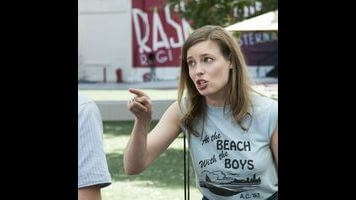Mickey and Gus land fatal blows in Love

All roads lead to the humiliating blow up. Or so it goes in “The Table Read,” where Gus and Mickey’s short relationship comes to a screeching halt as they unload all of their issues, essentially throwing the skewed character tropes they inhabit at each other as the ultimate insults. Mickey starts out thinking “crazy,” she’s internet-stalking him until she comes up with the idea drop in on him at work. It all leads to her yelling at Gus, “I’m not a crazy!” a claim that is patently false, although the degree of craziness is varied based on perspective. Gus, the nice guy who not might be so nice (hostile kindness!), spends his day being fake-nice to a women who ends up giving him a blow job in an empty hangar, even though he doesn’t seem to actually like her all that much and he just fucked a woman who he once did. Their days culminate in the real-truth telling that gives this episode its inherent power.
I think Mickey is less crazy, in the sense that we think of ultra-clingy women presented to use in the media, and more of an addict. She has a disease and she deals (or, rather doesn’t deal) with it through the mania she presents in this episode. Even Shaun sees the patterns repeating, saying it reminds her of a time during college with another guy, Leo. She needs a fix of Gus, perhaps because he rebuffed her and she will get it to by any means necessary. She’s always willing to risk her friendship with Bertie by using her to get this fix, not thinking about the consequences of what will happen when Bertie ultimately figures out that she’s being used (at least she has Randy to eat french fries with). It’s classic addict behavior: Get your fix and worry about consequences later (or not at all), even if that means hurting poor Bertie, who just wants to learn about the shooting locations of the epic Winslet-Diaz pairing The Holiday and, ultimately, refuses to put up with Mickey’s bullshit.
Gus starts his morning by seeming incredibly uncomfortable with the still peppy Heidi. Briga Heelan, by the way, is doing such a phenomenal job in this role, initially inhabiting a person that could be a foil for Mickey – her opposite – but slowly letting these other qualities, namely her narcissism, set in (“What if everyone is looking at me and I do amazing?”). Heidi isn’t the better version of Mickey, even though they seemed juxtaposed that way in “Closing Title Song.” Instead, she has her own set of issues for Gus, a fact he ignores in favor of someone to celebrate his success with and, eventually, get blown by. When he encounters Mickey in the dressing room with Arya, Mickey is a mess but he can’t break it off. He lets her dangle and leads her on, passive aggressively hemming and hawing when, in fact, he knows that this is over and isn’t into the relationship. “We’re a couple a somethings,” Gus says when Arya asks about their relationship status. “That’s the least sexy thing I’ve ever heard,” Arya replies. She’s right, there’s nothing less sexy than a guy who can’t say how he actually feels.
Their eventual confrontation is when these skewed character types come into play. What if the free spirit hooks up with the rule following nice guy? Rom coms will have us believe it ends in wedding bells, when Love takes the more cynical views – the fundamental differences between these people means it would end in a break up. The conversation is entirely metatextual. Gus would think showing up at work would be cute if he was into her. Right, if this was a movie, scene it would be the cute free spirit forcing the boring rule-follower out of his work routine. She’s already bonded with the young woman in his life (Arya), much like rom com heroine is wont to do, althought instead of giving her life advice, Mickey gives her terrible literary recommendations (Gary Gilmore is not sexy in The Executioner’s Song, unless I really misread that book). “You pretend to be this cool girl who doesn’t follow the rules of how things go. We have sex and then you become like every other lame girl who gets clingy and won’t give a guy space,” Gus says, immediately making me hate him so, so much. “Surprise, I’m not the cool girl,” Mickey says. That’s because the cool girl doesn’t exist. The “Cool Girl” concept is a central theme of Gone Girl. Gillian Flynn writes:
 Keep scrolling for more great stories.
Keep scrolling for more great stories.
